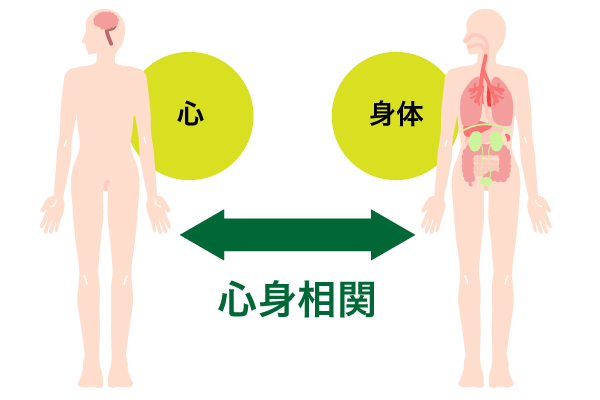“Psychosomatic internal medicine” is a medical specialty that practices psychosomatic medicine in the field of internal medicine.
Psychosomatic Medicine and Clinical Departments
The relationship between the mind and body is called the “psychosomatic correlation”.
- The application of the “psychosomatic correlation” to the medical field = “Psychosomatic Medicine”.
- “Psychosomatic Internal Medicine” is a department that practices the “psychosomatic medicine” in the field of internal medicine (this term is primarily used in Japanese medicine).
The Department of Psychosomatic Internal Medicine looks at illness not only from the physical aspect, but also from the psychological aspect, such as stress, and the social aspect, such as the family environment, while evaluating the relationship between the two.
Thus, “psychosomatic medicine” and “psychosomatic internal medicine” are differentiated according to whether they include only internal medicine or other areas such as dermatology and pediatrics, but hereafter the term “psychosomatic medicine” is used broadly and generally.

The main target of psychosomatic medicine is psychosomatic diseases.
Diseases related to psychological and social factors such as stress = “psychosomatic diseases”.
The definition of psychosomatic illness (in Japan) is as follows,
The term “psychosomatic disease” refers to a condition among physical diseases in which psychosocial factors are closely involved in the onset and course of the disease, and in which organic or functional impairment is observed. It excludes somatic symptoms associated with psychiatric disorders.
(Japanese Society of Psychosomatic Medicine, 1991)
As the phrase “among physical diseases” suggests, psychosomatic disease is one of the physical diseases (not psychiatric diseases). As the saying goes, “illness begins with the mind,” any disease, large or small, has a psychosomatic correlation. For example, even the common cold can be made more susceptible and less easily cured by stress, as the immune system is weakened. Among these, psychosomatic diseases are those in which psychosocial factors play a greater role.
Organic and functional diseases
- “Organic disorders” are disorders that cause physical (material) abnormalities, such as inflammation (bronchitis, etc.) and tumors (cancer, etc.). These are relatively easy to detect by X-ray or camera examinations.
- “functional disorder” is one in which there is no organic abnormality, and therefore no abnormality is found on x-ray or camera examination, but the movement or function of the body is impaired.
For example, in the digestive tract, irritable bowel syndrome, in which there is no cancer or inflammation but abnormal bowel movement, which causes symptoms such as abdominal pain, constipation, or diarrhea, is a typical example of a functional disorder.
Both of these involve psychosocial factors, but the involvement of “functional impairment” is easier to understand because the condition changes from moment to moment in relation to stress and other factors.
It is important to note, however, that the association between psychosocial factors and disease is not always simple and linear, as in simply “the mind causes the disease.
Psychosomatic medicine focuses on the “relationship” between psychosocial factors such as stress and disease states, and takes a both physical and mental approach.
(Kanbara K, LABs Psychosomatic Medicine, https://psychosom.net/en/column/psim/, Jan 2022)
